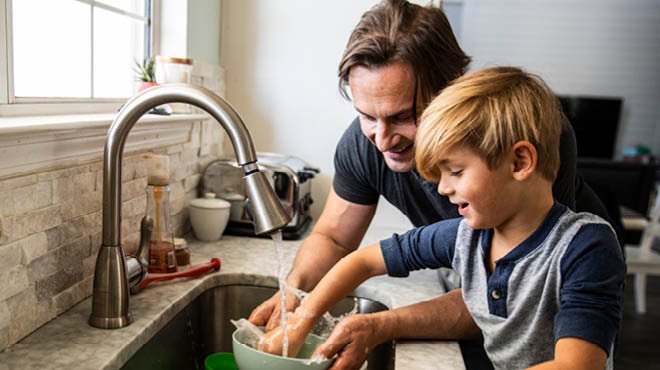Children with ADHD often feel rejected by peers due to hyperactive and impulsive behaviors. Parent training can help children with ADHD learn to socialize more effectively.
Provide routines and structure. Give students visual timetables on their desks, and allow them to take breaks after a set number of activities.
Give immediate praise when the child behaves well and follows directions. This will reinforce positive behavior.
Create a Quiet Space
Children with ADD and ADHD often exhibit attention-seeking behaviors, which can be challenging to manage. However, if you teach them to use a cool-down space (or time-in) and provide a consistent place to calm themselves, they can learn to regulate their emotions without your help.
Ensure the quiet spot is away from distractions such as doors, electronics or heavy traffic areas of your home. You can use a closet, tent, corner or even just a chair in their room. Add a few toys, books and calming colors to encourage relaxation. Some kids with ADHD need background music to help them relax, while others prefer quiet.
Establish routines for meals, homework, play and bed. This will help your child feel in control and can reduce stress. Make sure your child is getting enough sleep and a well-balanced diet. Consider enrolling them in organized activities that release excess energy, like sports, art or dance classes. Avoid reliance on TV, video games or other electronics as time fillers; these can increase the symptoms of ADHD.
Keep Things Organized
When overstimulated and frustrated, having a place to go can help kids with ADHD calm down. Teaching them how to use a comfortable spot in the classroom as a place of escape can be helpful. This doesn’t need to be seen as punishment, just a way to manage their behavior until they can return to class.
Keeping things organized can help children with ADHD stay on task, particularly in large settings. Ensure students are seated away from doors and windows or in an area with few distractions. It’s important to give clear and simple classroom rules and encourage positive behavior while minimizing the amount of negativity.
Children with ADHD need plenty of sleep and a healthy diet. Avoiding food products that contain preservatives and dyes like sodium benzoate (found in salad dressings) and yellow and red food coloring (in granola bars, cereal, juices, pickles, and soda) may be beneficial. Providing a physical outlet for energy is also important. Kids with ADHD often find that they can focus better after a little exercise.
Give Praise
Children with ADHD often receive criticism for their behavior, so it’s important to reinforce positive behaviors. Kids need quick feedback about how they’re doing, especially praise for good work.
Kids with ADHD need reminders about what to do, but they must also be allowed to make mistakes. They’re not trying to be difficult or bad and shouldn’t suffer because of their condition.
When students with ADHD break a rule, remind them calmly and confidently. This will help them feel like you believe in them and want them to succeed. It’s also important to set clear boundaries and enforceable consequences for behavior beyond the rules. However, remember that some children with ADHD may respond better to visual cues.
It’s also important to recognize when a child has improved their impulse control or focus. It would help if you celebrated these moments but remember that they still have a lot of work to do.
Allow Natural Consequences
Kids with ADHD don’t do well in ambiguous situations or require “reading between the lines.” Instead, they thrive on clear rules and expectations and respond to rewards and consequences. This can help manage symptoms of ADHD and improve performance in school and at home.
However, kids with ADHD often get frustrated when asked to do something difficult or boring. Their impulsivity can lead them to use avoidance strategies like tantrums, arguing and defiance. This can cause them to lose out on pleasurable activities like video games. Kids with ADHD are also prone to making mistakes while distracted, and they don’t have a high tolerance for frustration or failure. As a result, when confronted with an unfavorable consequence, they may feel shame and self-esteem issues arise.
A better strategy is to teach kids with ADHD how to control their behavior with natural consequences, like severing computer/video game privileges or having them do chores. Try simplifying their schedule and giving them low-stress activities, such as art projects or sports.
Encourage Social Skills
Children with ADHD may struggle with social skills, causing them to miss social cues, talk too much, or even offend their peers. They may not know their behavior is inappropriate or if they’re annoying other people, so it can be hard for parents and teachers to get their attention.
As kids learn to cope with their ADHD, they may start avoiding school activities or revert to less productive habits in their home life. Educational therapists can help these students develop systems for managing time, keeping track of school materials, and doing assignments on time.
Praise kids immediately when they behave well or follow directions. Use various phrases to praise them so it doesn’t become boring. Use a timer to let kids know how long an activity will last and when breaks are coming up. This will keep them engaged and allow them to practice their organizational skills. A therapist can also help kids understand their strengths and weaknesses in social situations. They can show kids how to read social cues, discuss inappropriate and appropriate behaviors, and teach them how to respond to others’ needs.



